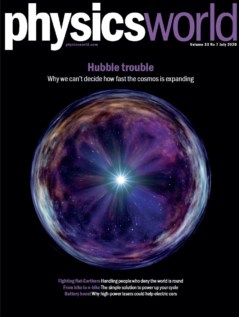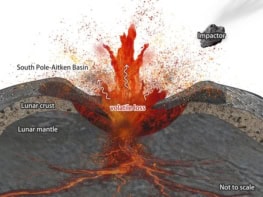The July 2020 issue of Physics World covers discrepancies in the Hubble constant, how to deal with people who think the Earth is flat, and why blue lasers could boost electric batteries

Europe’s Planck mission famously measured the Hubble constant to the greatest precision ever, finding it to be 67.4 km/s/Mpc, measured to an uncertainty of less than 1%.
In other words, every stretch of space a million parsecs (3.26 million light-years) wide is expanding by a further 67.4 km every second – and suggesting the universe is 13.8 billion years old.
So how come more-recent measurements of our “local universe” yield a different figure of 73.3 km/s/Mpc, with an uncertainty of 2.4% – suggesting the universe is not as old as we thought.
In the July 2020 issue of Physics World, Keith Cooper’s cover feature investigates the discrepancies and examines what the implications could be.
If you’re a member of the Institute of Physics, you can read the whole of Physics World magazine every month via our digital apps for iOS, Android and Web browsers. Let us know what you think about the issue on Twitter, Facebook or by e-mailing us at pwld@ioppublishing.org.
For the record, here’s a rundown of what else is in the issue.
• Scientists strike in racism protest – Researchers, scientific societies and publishers took part in a one-day strike last month to consider how to combat racism and discrimination in science, as Peter Gwynne and Matin Durrani report
• Growing the gravitational-wave network – David Reitze, executive director of the Laser Interferometer Gravitational-Wave Observatory, talks to Richard Blaustein about how gravitational-wave observations are set for a multi-detector boost
• The danger of going online only – Harry Collins, Bill Barnes and Riccardo Sapienza warn againsta wholesale shift to virtual workshops and conferences following the COVID-19 pandemic
• The e-bike revolution – Electric bikes are all the rage, but James McKenzie wonders if the future lies with a minimalist kit that can be retrofitted to an ordinary bicycle
• Transmogrified physics II – Robert P Crease reports on your latest work in the exciting new scientific field he discovered
• Finding a consistent constant – The Planck mission gave us the most precise value of the Hubble constant to date by measuring the cosmic microwave background. But studies made since using different methods provide different values. Keith Cooper investigates the discrepancies and asks what it might mean for cosmology
• Fighting flat-Earth theory – Physicists will find it shocking, but there are plenty of people around the world who genuinely believe the Earth is flat. Rachel Brazil explores why such views are increasingly taking hold and how the physics community should best respond
• The blue solution – Powerful blue lasers are producing the high-quality copper welds needed to make batteries for electric vehicles, as Richard Stevenson reports
• Cracking the quantum code – Kate Gardner reviews FX/BBC TV quantum-tech series Devs
• Net entanglement – Andrew Robinson reviews The System: Who Owns the Internet, and How It Owns Us by James Ball
Hubble at 30: how NASA’s telescope went from ‘techno-turkey’ to iconic observatory
• Training a computer to fight cancer – Medical physicist and entrepreneur Maryellen Giger talks to Margaret Harris about how she established the use of AI in breast cancer imaging
• Ask me anything – Sabine Hossenfelder from the Frankfurt Institute for Advanced Studies gives her advice to early-career physicists
• Lateral thoughts – Summer quiz 2020




